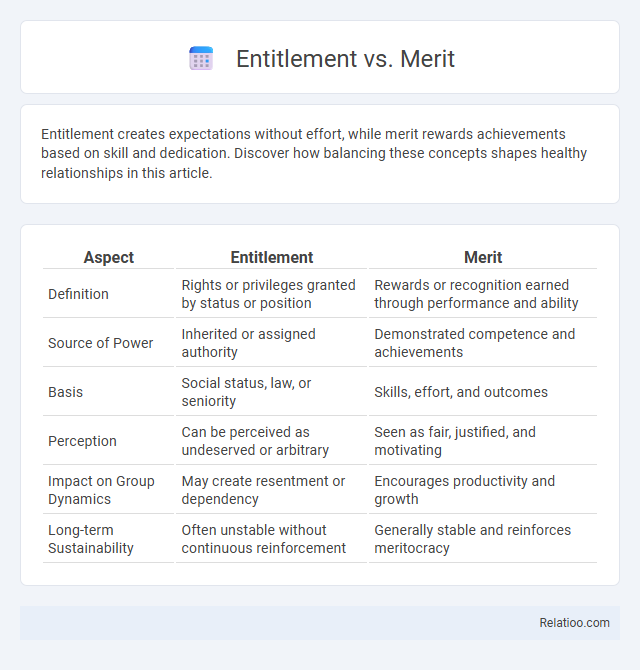Entitlement creates expectations without effort, while merit rewards achievements based on skill and dedication. Discover how balancing these concepts shapes healthy relationships in this article.
Table of Comparison
| Aspect | Entitlement | Merit |
|---|---|---|
| Definition | Rights or privileges granted by status or position | Rewards or recognition earned through performance and ability |
| Source of Power | Inherited or assigned authority | Demonstrated competence and achievements |
| Basis | Social status, law, or seniority | Skills, effort, and outcomes |
| Perception | Can be perceived as undeserved or arbitrary | Seen as fair, justified, and motivating |
| Impact on Group Dynamics | May create resentment or dependency | Encourages productivity and growth |
| Long-term Sustainability | Often unstable without continuous reinforcement | Generally stable and reinforces meritocracy |
Understanding Entitlement: Definition and Origins
Entitlement refers to the belief or sense that one inherently deserves certain privileges or rights, often without corresponding effort or merit. This concept originates from social and psychological factors, where past experiences, upbringing, and cultural norms shape an individual's expectations of what they are owed. Understanding entitlement is crucial for You to distinguish between deserved rewards based on merit and perceived rights rooted in entitlement, impacting personal and professional relationships.
The Concept of Merit: What Does It Really Mean?
Merit represents the value assigned to skills, achievements, and efforts that justify rewards or recognition within a system. Unlike entitlement, which is based on inherent rights or status, merit requires demonstrable competence and contributions. Your understanding of merit impacts how fairness and motivation are balanced in organizational and societal contexts.
Entitlement vs Merit: Key Differences
Entitlement refers to a guaranteed right or claim to something based on established rules or policies, while merit is earned through individual effort, skills, or achievements. Your access to benefits or opportunities based on entitlement requires minimal personal input, whereas merit-based systems prioritize performance and qualifications. Understanding these key differences helps you navigate organizational decisions and resource allocations more effectively.
How Entitlement Shapes Mindsets and Behaviors
Entitlement shapes mindsets by fostering expectations of unearned privileges, often leading to decreased motivation and accountability in your personal and professional life. Unlike merit, which rewards effort and achievement, entitlement can create a sense of complacency and reduce the drive to improve skills or contribute meaningfully. Recognizing how entitlement influences behavior is essential for developing a balanced approach that values earned success and responsible self-awareness.
The Role of Merit in Personal and Professional Growth
Merit plays a pivotal role in personal and professional growth by emphasizing skills, achievements, and effort rather than relying on entitlement or inherited rights. Your advancement depends on proving competence and consistently delivering results, which fosters genuine recognition and long-term success. Organizations that prioritize merit cultivate a culture of fairness and encourage continuous improvement among individuals.
Societal Impacts of Entitlement Culture
Entitlement culture fosters expectations of rewards or privileges without corresponding effort, leading to decreased motivation and productivity in society. Merit-based systems promote fairness and incentivize achievement by allocating resources and opportunities according to skills and accomplishments. The tension between entitlement and merit influences social cohesion, economic mobility, and perceptions of justice within communities.
Rewarding Merit: Benefits and Challenges
Rewarding merit fosters motivation, productivity, and innovation by recognizing individual achievements and skills in the workplace. While entitlement systems provide guaranteed rewards regardless of performance, merit-based rewards ensure fairness and encourage continuous improvement but can pose challenges such as subjective evaluations and potential bias. Balancing these approaches requires transparent criteria and consistent feedback to maximize employee engagement and organizational success.
Balancing Entitlement and Merit in Modern Workplaces
Balancing entitlement and merit in modern workplaces requires a strategic approach that aligns employee expectations with performance outcomes. Organizations must implement clear criteria and transparent evaluation systems to ensure entitlement rights do not undermine merit-based rewards, fostering motivation and fairness. Effective balance promotes a culture where recognition is based on actual contributions, enhancing overall productivity and job satisfaction.
Addressing Entitlement in Education and Family Life
Addressing entitlement in education and family life requires distinguishing between entitlement, which is an expectation of rights without effort, and merit, which is earned through achievement and responsibility. Encouraging merit-based recognition fosters motivation, accountability, and resilience in students and family members, counteracting entitlement attitudes that can undermine personal growth and social contribution. Creating clear expectations and consistent consequences helps promote a culture where effort and achievement are valued over unearned privileges.
Fostering a Merit-Based Society: Steps Forward
Fostering a merit-based society requires balancing entitlement with recognition of individual achievements to promote fairness and motivation. You can implement transparent evaluation systems and reward mechanisms that emphasize skills, effort, and results over inherited privileges or unearned benefits. Encouraging continuous learning and equal opportunities ensures that merit, rather than entitlement, drives social and professional advancement.

Infographic: Entitlement vs Merit
 relatioo.com
relatioo.com